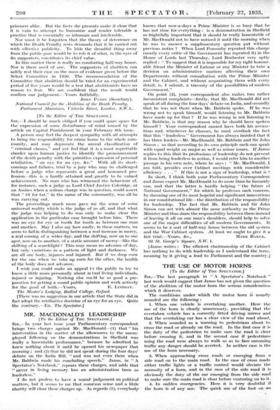[To the Editor of THE SPECTATOR.] SIR,—I should be much
obliged if you could spare space for the expression of some disturbance of mind roused by the article on Capital Punishment in your February 8th issue.
A person may feel the deepest sympathy with all attempts to bring the responsibility for crime home to the whole com- munity, and may deprecate the unreal classification of "criminal classes," and yet feel that it is a most regrettable slander upon human justice to identify the pronouncement of the death penalty with the primitive expression of personal retaliation, "an eye for an eye, &e." With all its short- comings and failures, trial by a jury who may be challenged before a judge who represents a great and honoured pro- fession—this is a hardly attained and greatly to be valued achievement. No man who has witnessed the behaviour of, for instance, such a judge as Lord Chief Justice Coleridge, at an Assizes when a serious charge was in question, could assert that "tit for tat," in the name of the community, was all he was carrying out.
The proceedings much more gave me the sense of some universal reality which is the judge of us all, and that what the judge was helping to do was only to make clear the application in the particular case brought before him. There was no eye for eye or tooth for tooth as between one man and another. May I also say how easily, in these matters, we seem to fail in distinguishing between a real increase in mercy, a real coming of a wider day,- and the shifting, now on to one spot, now on to another, of a static amount of mercy—like the shifting of a searchlight ? This may mean no advance of day, but only variations in a pattern of light and darkness. We are all one body, injurers and injured. But if we drop corn for the one when we take up corn for the other, the health of the body does not advance.
I wish you could make an appeal t ri the public to try to know a little more personally about at lual living individuals, injured or injuring. Nothing else cot Id be so good a pre- paration for getting a sound public opinion and work actively
for the good of both.—Yours, E. LINDSAY. The Master's Lodging, Balliol College, Oxford.
[There was no suggestion in our article that the State did in fact adopt the retributive doctrine of an eye for an eye. • Quite the contrary.—En. The Spectator.]


















































 Previous page
Previous page